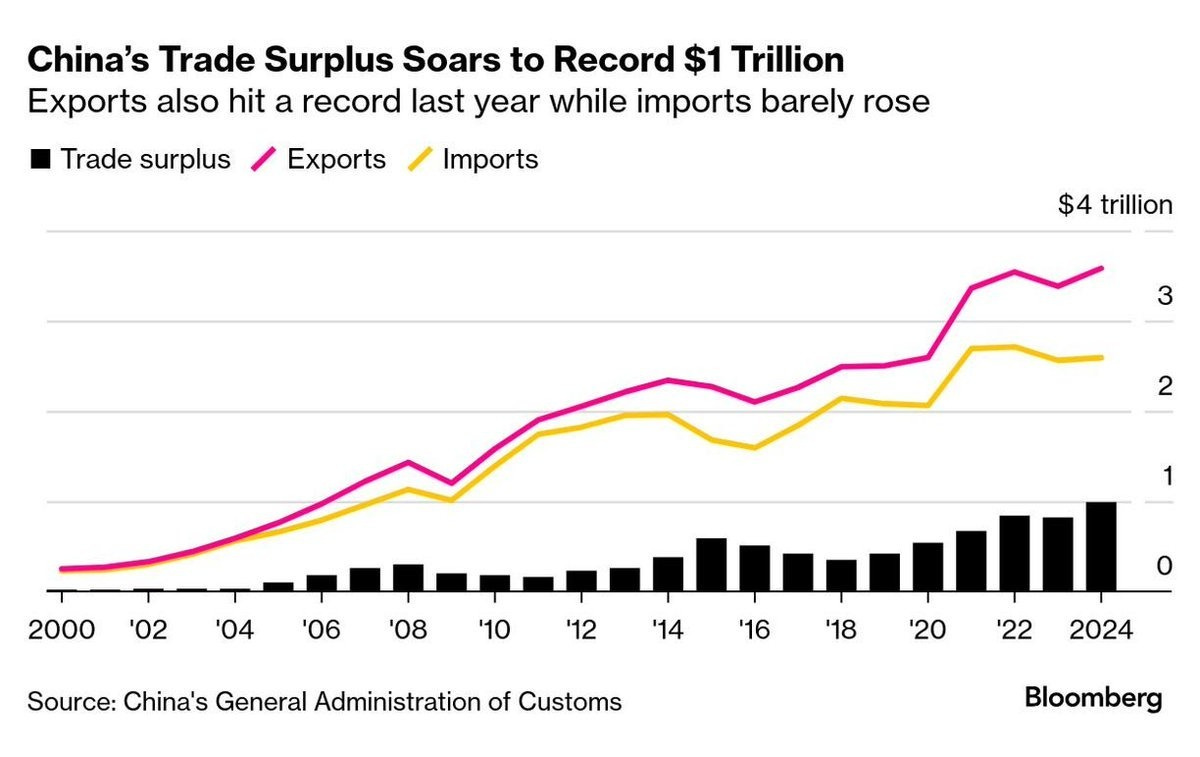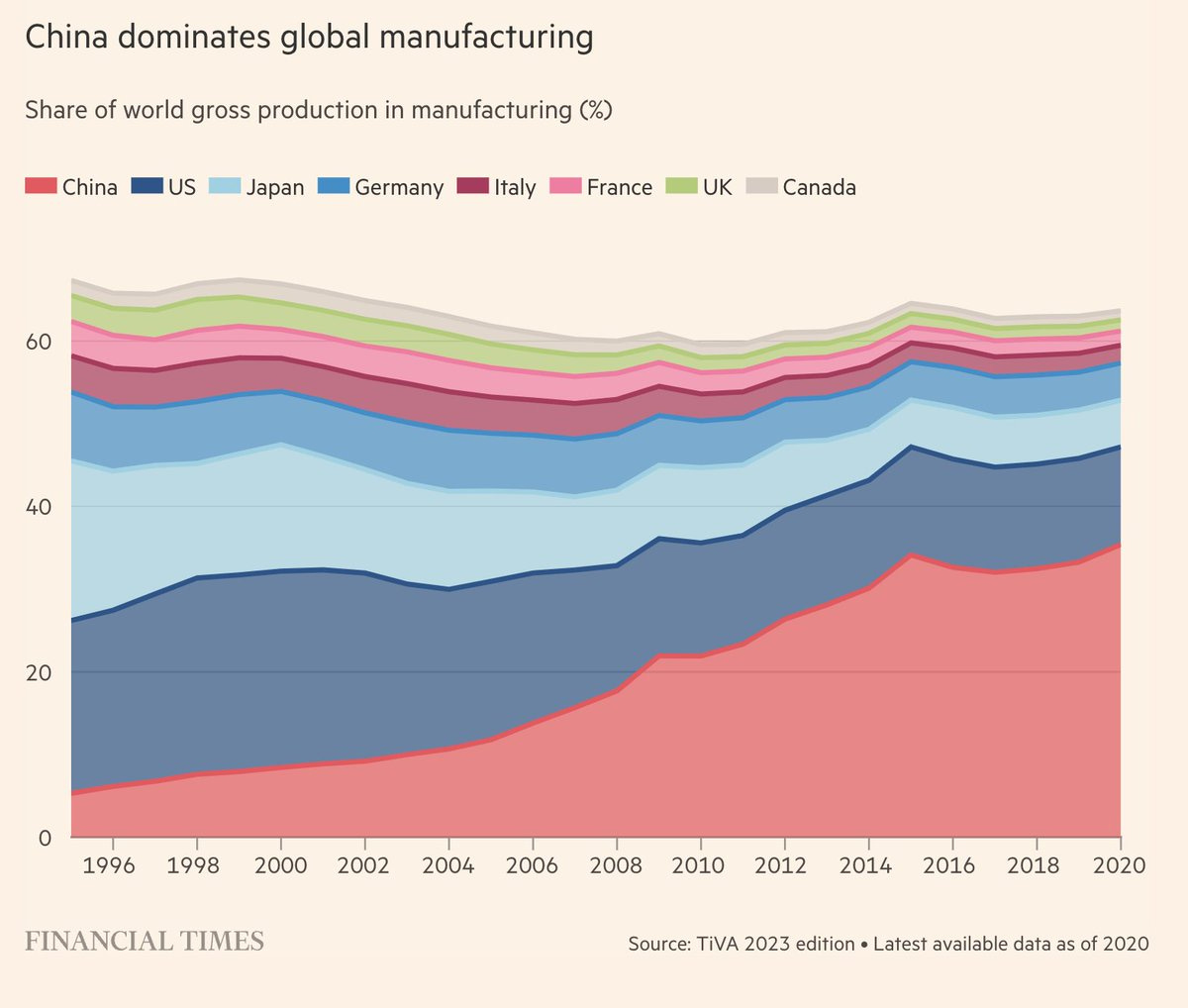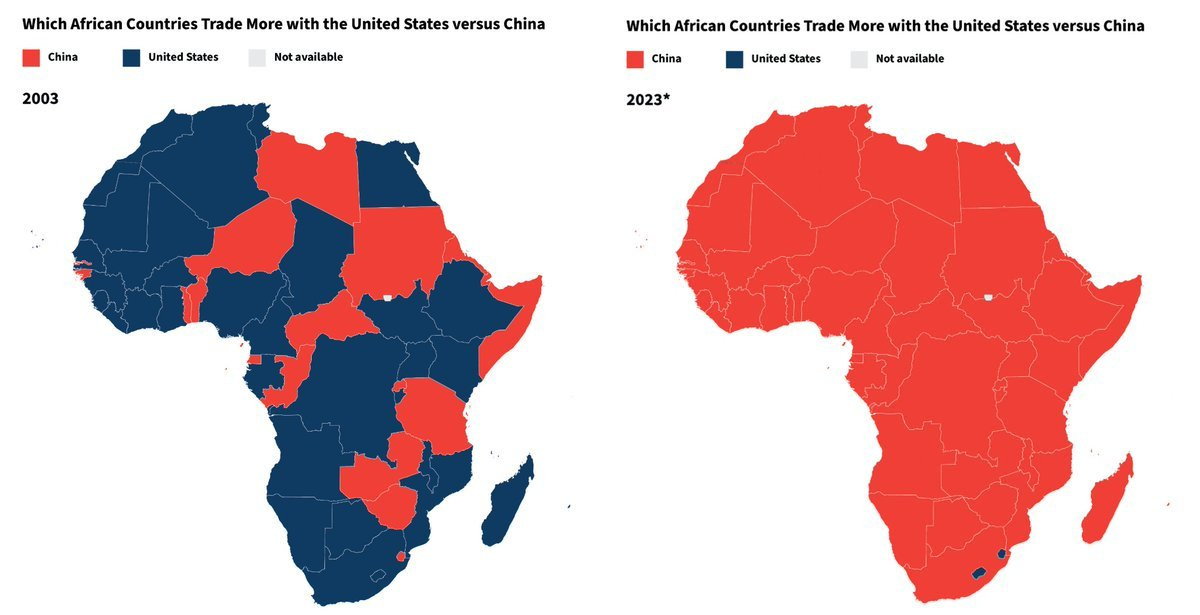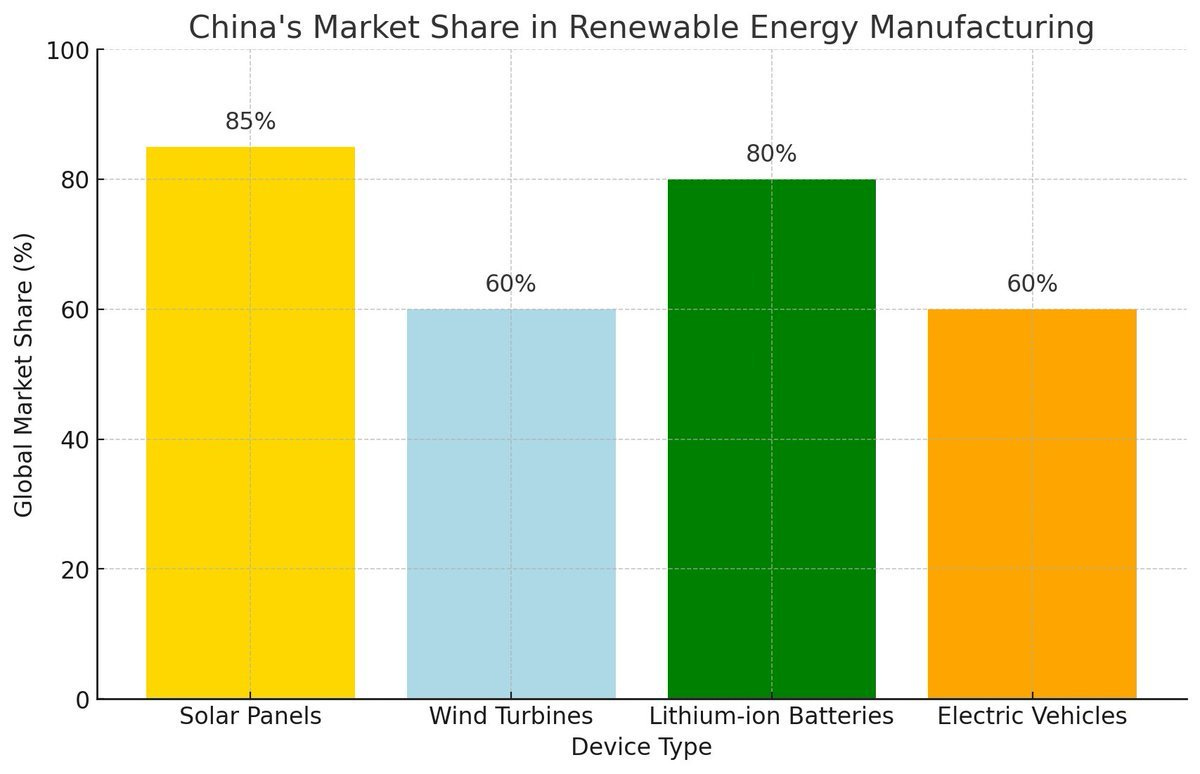風蕭蕭_Frank
以文會友擁抱中國經濟崛起
https://www.theglobalcurrents.com/p/embracing-chinas-economic-rise
Jostein Hauge 2025年4月30日 政治經濟學家兼劍橋大學教授 jlh202@cam.ac.uk
盡管存在一些危言聳聽的言論,但世界仍將從中國的經濟增長中受益。
<<<<<<<<<<<<<<>>>>>>>>>>>>
Jostein Hauge 博士是一位政治經濟學家,也是劍橋大學發展研究助理教授,在發展研究中心和政治與國際研究係工作。他還是發展研究哲學碩士項目主任和抹大拉學院的研究員。他的研究領域涵蓋國際政治經濟學和發展經濟學的交叉領域。他是《工廠的未來:大趨勢如何改變工業化》(由牛津大學出版社出版)一書的作者。本書探討了近期技術發展、全球化新力量以及生態崩潰威脅如何塑造工業化路徑,並規劃了產業政策和全球治理的新路徑。
喬斯坦近期的研究成果發表於各類學術期刊,包括《非洲事務》、《發展政策評論》、《地理論壇》、《新政治經濟學》、《第三世界季刊》和《世界經濟》。除了學術研究之外,喬斯坦還與各國政府和國際組織合作,並與聯合國非洲經濟委員會、聯合國工業發展組織、世界經濟論壇以及英國商業、能源和工業戰略部共同撰寫報告和文章。他的作品也發表於《衛報》、《經濟學人》和彭博社等多家媒體。
在劍橋大學任職之前,喬斯坦曾擔任倫敦政治經濟學院國際政治經濟學研究員。他還曾在劍橋大學科學、技術與創新政策中心擔任研究員。他擁有劍橋大學政治與國際研究係博士學位,導師是張夏準 (Ha-Joon Chang)。他擁有倫敦大學亞非學院發展經濟學碩士學位,以及挪威科技大學經濟學學士學位。
喬斯坦的教學涵蓋發展經濟學、國際政治經濟學以及非洲發展政治經濟學。他還教授論文和學位論文寫作技巧,指導碩士和博士論文項目,並擔任抹大拉學院的教務主任。
<<<<<<<<<<<<<<>>>>>>>>>>>>
正文
中國在世界經濟中的崛起可以說是21世紀最重要的經濟和政治事件。它正以驚人的速度重塑全球貿易和地緣政治。許多西方國家,尤其是美國,對此感到擔憂。唐納德·特朗普的關稅就是最明顯的例子。但對中國崛起的敵對反應是錯誤的。中國的崛起並非對全球穩定的威脅——而是一種我們應該歡迎的發展。
中國崛起成為經濟超級巨星的速度之快前所未有。中國在全球貿易中的主導地位支撐了這一崛起:中國最近成為曆史上第一個貿易順差達到1萬億美元的國家。
感謝閱讀“全球潮流”!免費訂閱以接收新文章並支持我的工作。
這種主導地位得益於出口導向型工業化進程。中國幾乎在全球所有製造業領域都發揮著重要作用。目前,中國占全球製造業的35%以上,預計到2030年將增至45%。
圖片來源:Joe Leahy、Tina Hu、Chan Ho-him,《金融時報》
中國在全球貿易和全球製造業中的主導地位,已引起一些國家的警惕,尤其是美國,美國日益將中國視為經濟威脅和競爭對手。目前,美國對華敵視立場幾乎已達成兩黨共識。自2018年以來,共和黨和民主黨政府都針對中國實施了嚴格的貿易限製措施,例如出口限製和關稅。
當然,人們有理由擔心中國在全球貿易和製造業中的主導地位。如果中國在這些領域的主導地位持續增長,那麽世界其他國家將無法瓜分到足夠的“蛋糕”。除美國外,許多國家都對其與中國競爭的能力表示擔憂,其中包括德國、日本、韓國、智利、土耳其和印度等。然而,我們應該記住,中國本身並沒有侵蝕這些國家的製造業能力,也沒有阻止這些國家製造業能力的發展。這是一個複雜的過程。
已發布的圖景。
就中國正在構建的對外關係而言,情況也十分複雜。陳凱爾認為,中國在海外實施了多種“產業外交”戰略。在一些國家,例如巴西、印度尼西亞和墨西哥,中國正在加大製造業投資。但在其他國家,尤其是印度,中國正在限製工人和設備的流動。
中國在世界經濟中的崛起顯然有利有弊。但我認為,利大於弊。
西方國家從中國的崛起中獲益
中國在20世紀90年代和21世紀初開始成為全球經濟的重要參與者,並以2001年加入世界貿易組織為標誌。這受到了大多數西方國家的歡迎。對於西方的消費者和企業而言,中國融入世界經濟意味著能夠獲得價格低得多的製成品,以及更多樣化的製成品,包括投入品和製成品。
有一個國家尤其受益於中國提供的高效低成本生產體係:美國。威廉·米爾伯格和黛博拉·溫克勒的研究表明,從20世紀80年代到2010年代初,美國進口製成品的價格相對於美國非貿易部門的消費者價格大幅下降,有些甚至下降了40%以上。
美國企業是中國融入世界經濟的最大受益者之一。人們普遍誤以為中國企業正在超越美國企業。雖然在某些領域確實如此——而且這種現象正在日益增多——但中國的資本主義崛起實際上在某些方麵增強了美國的結構性實力,尤其是通過為美國企業創造更多利潤。肖恩·斯塔爾斯的研究發現,在全球大多數行業仍然由美國企業主導,這得益於中國的崛起。斯塔爾斯強調,對華投資和從中國進口的投入品使美國企業得以保持其全球主導地位。
電子巨頭蘋果就是一個很好的例子。蘋果在中國市場賺得盆滿缽滿:過去10年,其營業利潤高達2270億美元,占其同期營業利潤的四分之一以上。
美國科技巨頭對中國商品的依賴近來備受關注。美國總統唐納德·特朗普於2025年4月宣布對中國進口產品征收高額關稅,美國科技行業的CEO們對此感到憤怒,公司股價應聲暴跌。但這些CEO們迅速遊說特朗普,並成功促使他降低對中國製造電子產品的關稅。蘋果、英偉達和微軟等大型科技公司都完全依賴這些產品。盡管許多公司計劃減少對中國生產體係的依賴,但目前這對它們來說根本無利可圖。蘋果的供應鏈就是一個很好的例子。目前,蘋果使用的187家供應商中,有157家在中國設有分支機構。
人們普遍認為,中國從與美國企業建立的經濟關係中獲益——既通過吸引投資,也通過向美國企業提供投入。中國確實巧妙地利用了與蘋果等公司的關係,以增強技術能力。但我們很難說中國得到了公平的待遇。例如,在整個2010年代,組裝iPhone的中國工人和公司獲得的分成不到最終零售價的1.5%。中國工人在服務於美國市場的工廠裏辛苦勞作,幾乎隻為幾分錢。
中國崛起為全球南方國家提供新的(可能也是更好的)夥伴關係
中國致力於加強與世界各地的經濟關係。對於全球南方國家來說,這是一個加強與超級大國聯係的機會,因為這兩個國家麵臨著共同的挑戰:試圖擺脫經濟邊緣地位。從這個意義上說,中國為現有的南北關係提供了一個備受歡迎的替代方案。現有的南北關係往往(現在仍然如此)以北方設計的帝國主義安排為特征,旨在從南方攫取利潤和資源。雖然中國或許並非全球南方國家經濟發展的靈丹妙藥——我們也需要認識到中國在全球南方國家采取的多元化戰略——但中國要打破西方國家在發展中國家(尤其是在拉丁美洲和非洲)的糟糕參與記錄並非難事。
我們應該特別關注非洲,中國加強了與非洲的經濟和政治關係。目前,中國已成為幾乎所有非洲國家最重要的貿易夥伴。這與21世紀初非洲國家與美國等西方夥伴的貿易往來更為頻繁的情況形成了鮮明對比。
圖片 來源:卡內基國際和平基金會,紮伊納布·烏斯曼
中國在非洲已廣受歡迎。在撒哈拉以南地區
在非洲,近300項針對該地區的調查顯示,對中國的正麵評價與負麵評價的比例約為3比1。中國也為非洲的經濟發展做出了貢獻。一項對100多篇文章的回顧發現,在非洲的中國企業對經濟發展、能力建設和創新產生了積極影響。
來源:亞洲協會政策研究所
這並不意味著中國對非洲的經濟影響一定是絕對積極的。但這種觀點往往過於偏向另一個方向,不加批判地強化了關於中國在非洲崛起的負麵說法——這些說法往往缺乏真實證據。揭穿這些說法至關重要。關於中國在非洲推行“債務陷阱外交”的說法就是一個很好的例子。這指的是中國通過向非洲國家提供大量貸款,使它們陷入債務陷阱的一種策略。事實證明,這種說法完全是無稽之談。一項調查了1000多筆非洲貸款的研究發現,中國貸款機構從未扣押過資產,從未通過法院強製執行還款,也從未征收過罰息。
中國是氣候衛士
中國對氣候的影響備受爭議。一方麵,中國的工業化進程導致溫室氣體排放大幅增長。另一方麵,中國已成為可再生能源技術開發領域的全球領導者。我認為,後者的收益大於前者的成本。
深入研究中國排放量增長的細節,才能全麵了解其背景。如果我們考察基於消費的排放量(這至關重要,因為我們不僅要考慮產品的生產地點,還要考慮消費地點),那麽按人均計算,中國遠不及其他一些主要國家(尤其是美國)那麽糟糕。下圖展示了這一情況,它甚至沒有考慮各國的曆史排放量。如果考慮這些國家的曆史排放量,那麽大多數西方國家的排放量都會遠低於中國。因此,盡管中國肯定能夠努力減少排放,但責任主要在於西方。
圖片 來源:Our World in Data
中國排放量的增長很大程度上可以歸因於快速的工業化進程。在這方麵,值得注意的是,中國利用其工業化進程和產能的提升,大規模擴大了可再生能源設備的生產規模。截至2024年,中國占據了全球各類可再生能源設備市場份額的60%至85%,包括太陽能電池板、風力渦輪機、鋰離子電池和電動汽車的生產。這不僅有助於中國減緩排放增長,也有助於其他國家通過向其出口這些產品來效仿。
圖片 來源:Jostein Hauge(作者),各種在線資源
對中國有利的,就是對世界很大一部分有利
我想在本文最後強調一個在關於中國崛起的辯論中經常被忽視的觀點:如果中國做了一件有利於其大多數人口的事情,那麽從定義上講,這也惠及了世界很大一部分人。為什麽呢?因為中國約占世界人口的17%。根據世界銀行的數據,自1980年以來,中國脫貧的人數超過了世界其他地區脫貧的人數。這是中國取得的非凡成就,任何關心國際發展的人士都應該為此感到高興。
我們看到,中國的經濟崛起雖然並非沒有挑戰,但也帶來了不可否認的好處。然而,危言聳聽的反華言論不幸地掩蓋了中國融入世界經濟的積極方麵。當世界很快對中國的崛起產生懷疑時,是時候改變說法了。
Embracing China's economic rise
https://www.theglobalcurrents.com/p/embracing-chinas-economic-rise
 JOSTEIN HAUGE APR 30, 2025 Political economist and Professor,University of Cambridge jlh202@cam.ac.uk
JOSTEIN HAUGE APR 30, 2025 Political economist and Professor,University of Cambridge jlh202@cam.ac.uk
Dr Jostein Hauge is a political economist and an Assistant Professor in Development Studies at the University of Cambridge, based at the Centre of Development Studies and the Department of Politics and International Studies. He is also the Director of the MPhil in Development Studies and a Fellow of Magdalene College. His research lies at the intersection of international political economy and development economics. He is the author of The Future of the Factory: How Megatrends are Changing Industrialization, published by Oxford University Press. The book investigates how industrialization pathways are shaped by recent technological developments, new forces of globalization, and the threat of ecological collapse. It also charts new pathways for industrial policy and global governance.
Jostein’s recent research has been published in various academic journals, including African Affairs, Development Policy Review, Geoforum, New Political Economy, Third World Quarterly, and World Economy. In addition to his academic research, Jostein works with governments and international organisations, and has co-authored reports and articles for the UN Economic Commission for Africa, the UN Industrial Development Organisation, the World Economic Forum, and the UK Department for Business, Energy, and Industrial Strategy. His work has also appeared in various media outlets, such as The Guardian, The Economist, and Bloomberg.
Prior to his current post at the University of Cambridge, Jostein was an LSE Fellow in International Political Economy at the London School of Economics and Political Science. He has also worked as a Research Associate at the Centre for Science, Technology and Innovation Policy at the University of Cambridge. He has a PhD degree from the Department of Politics and International Studies at the University of Cambridge, where he was supervised by Ha-Joon Chang. He obtained his Master’s degree in Development Economics from the University of London's School of Oriental and African Studies, and his Bachelor’s degree in Economics from the Norwegian University of Science and Technology.
Jostein’s teaching covers development economics, international political economy, and political economy of development in Africa. He also teaches skills for essay - and dissertation writing, supervises MPhil and PhD dissertation projects, and is a Director of Studies at Magdalene College.
Thanks for reading Global Currents! Subscribe for free to receive new posts and support my work.
This dominance has been made possible by an export-led industrialisation push. China plays a part in practically all global manufacturing industries. It now accounts for more than 35% of global manufacturing, a number which is expected to increase to 45% by 2030.
 Source: Joe Leahy, Tina Hu, Chan Ho-him, Financial Times
Source: Joe Leahy, Tina Hu, Chan Ho-him, Financial Times
China’s dominance in global trade and global manufacturing have raised alarm bells in some countries, particularly the US, which increasingly views China as an economic threat and competitor. The hostile stance towards China has practically reached bipartisan consensus in the US now. Since 2018, both Republican and Democratic administrations have implemented strict trade restrictions aimed at China, such as export restrictions and tariffs.
There are of course legitimate reasons to worry about China’s dominance in global trade and manufacturing. If China’s dominance in these areas keeps growing, there will simply not be enough of the ‘pie’ to share between the rest of the world. Beyond the US, many countries have expressed concerns about their ability to compete with China, including Germany, Japan, South Korea, Chile, Turkey and India, to name a few. However, we should keep in mind that China has not by itself eroded manufacturing capabilities in these countries or prevented manufacturing capabilities in these countries from developing. It’s a complicated picture.
With respect to the ties that China is building abroad, the picture is also complicated. Kyle Chan argues that China has diverse strategies of ‘industrial diplomacy’ abroad. In some countries, such as Brazil, Indonesia, and Mexico, China is ramping up manufacturing investment. But in other countries, most notably India, China is limiting the flow of workers and equipment.
China’s rise in the world economy clearly comes with benefits and drawbacks. But I’d argue that the benefits outweigh the drawbacks.
The West has profited from China’s rise
China started becoming a big player in the global economy in the 1990s and 2000s, marked by membership in the World Trade Organization in 2001. This was welcomed by most countries in the West. For consumers and corporations in the West, China’s integration into the world economy meant access to vastly cheaper manufactured goods and access to a larger variety of manufactured goods, both as inputs and finished goods.
One country in particular took advantage of the efficient and low-cost production systems that China offered: the US. William Milberg and Deborah Winkler have documented that the price of manufactured goods imports into the US have declined massively relative to US consumer prices in non-traded sectors between the 1980s and early 2010s, in some instances by more than 40%.
US corporations are among the greatest beneficiaries of China’s integration into the world economy. There is a common misconception that Chinese firms are outcompeting US firms. While this is true in some sectors — and is increasingly happening —, the capitalist rise of China has actually boosted US structural power in certain ways, especially by generating more profits for US corporations. Research by Sean Starrs finds that most global industries are still dominated by US corporations, aided by China’s rise. Starrs highlights that both investments in China and imports of inputs from China have enabled US corporations to maintain their global dominance.
The electronics giant, Apple, is the perfect case in point. Apple has made a fortune in China: $227 billion in operating profit over the past 10 years, which accounts for over a quarter of its operating profit during this period.
 US tech giants’ dependency on Chinese goods was in the spotlight recently. When US president Donald Trump announced steep tariffs on Chinese imports in April 2025, CEOs in the US tech industry were outraged as the share prices of their companies plummeted. But these CEOs rapidly and successfully lobbied Trump to quickly lower tariffs on Chinese-made electronics items, which big tech firms, such as Apple, Nvidia and Microsoft, are completely dependent on. Although many of these corporations have plans to become less dependent on China’s production systems, it’s simply not economically profitable for them at this point. Apple’s supply chain is a good case in point. 157 of the 187 suppliers used by Apple currently have a presence in China.
US tech giants’ dependency on Chinese goods was in the spotlight recently. When US president Donald Trump announced steep tariffs on Chinese imports in April 2025, CEOs in the US tech industry were outraged as the share prices of their companies plummeted. But these CEOs rapidly and successfully lobbied Trump to quickly lower tariffs on Chinese-made electronics items, which big tech firms, such as Apple, Nvidia and Microsoft, are completely dependent on. Although many of these corporations have plans to become less dependent on China’s production systems, it’s simply not economically profitable for them at this point. Apple’s supply chain is a good case in point. 157 of the 187 suppliers used by Apple currently have a presence in China.
It’s commonly argued that China has benefitted from the economic relationships forged with US corporations — both through attracting investments and through supplying US corporations with inputs. China has indeed utilised relationships with companies such as Apple in clever ways in order to build up technological capabilities. But we can hardly claim that China has gotten a fair deal. For example, throughout the 2010s, Chinese workers and firms that assembled the iPhone got less than 1.5% of the final retail price. Chinese workers have literally toiled for pennies in factories serving US markets.
China’s rise offers new (and potentially better) partnerships for the Global South
China has made a committed effort to strengthen economic relationships across the world. For countries in the Global South, this is an opportunity to strengthen ties with a superpower that shares a common challenge: trying to emerge from the economic periphery. In this sense, China provides a welcome alternative to existing North-South relationships, which have often been (and often still are) characterised by imperial arrangements designed by the North to extract profits and resources from the South. While China may not be a magic bullet for economic development in the Global South at large — and while we need to recognise China’s diverse strategies in the Global South —, it would not take much for China beat the poor track record of Western involvement in developing countries, especially in Latin America and Africa.
We should pay particular attention to Africa, where China has strengthened both economic and political relationships. By now, China is the most important trading partner for almost all African countries. This stands in stark contrast to the situation in the early 2000s, when African countries traded more with Western partners, such as the US.
 Source: Zainab Usman, Carnegie Endowment for International Peace
Source: Zainab Usman, Carnegie Endowment for International Peace
China has become highly popular in Africa. In Sub-Saharan Africa, positive views of China outweigh negative views by a factor of about 3 to 1 across nearly 300 surveys in the region. China is also contributing to economic development in Africa. A review of over 100 articles found that Chinese firms in Africa have a positive impact on economic development, capacity building, and innovation.
 Source: Asia Society Policy Institute
Source: Asia Society Policy Institute
This does not mean that China’s economic impact in Africa is unambiguously positive. But the pendulum tends to swing too much in the other direction, uncritically reinforcing negative narratives about China's rise in Africa — often with little to no grounding in real evidence. It’s important to debunk such narratives. The narrative about China's "debt-trap diplomacy" in Africa is a good example. This refers to a perceived strategy whereby China provides substantial loans to African nations as a way to trap them into debt. This narrative has turned out to be nonsense. A study that looked at more than 1,000 loans to Africa found that Chinese lenders never seized assets, never used courts to enforce payments, and never applied penalty interest rates.
China is a climate champion
China’s impact on the climate is heavily debated. On the one hand, China’s industrialisation has entailed considerable growth in greenhouse gas emissions. On the other hand, China has become a global leader in efforts to develop technology for renewable energy. I would argue that the benefits of the latter outweigh the costs of the former.
It’s important to look into the details of China’s growing emissions to understand the full context of them. If we look at consumption-based emissions (which is vital because we want to account for where things are consumed, not only produced), China is not nearly as bad as some other major countries, most notably the US, in per capita terms. The below chart, which depicts this, doesn’t even account for countries’ historical emissions. If it did, most countries in the West would score far worse than China. So, while China can surely work on reducing their emissions, the responsibility to do so primarily lies with the West.
 Source: Our World in Data
Source: Our World in Data
China’s growing emissions can largely be attributed to rapid industrialisation. In this respect, it’s important to note that China has used its industrialisation and increased productive capacity to massively scale up production of renewable energy devices. As of 2024, China accounted for 60-85% of the global market share across a range of renewable energy devices, including the production of solar panels, wind turbines, lithium-ion batteries and electric vehicles. This is not only helping China slow down growth in emissions — it’s also offering other countries to do the same by exporting these products to them.
 Source: Jostein Hauge (author), various online sources
Source: Jostein Hauge (author), various online sources
What’s good for China is good for a big part of the world
I’d like to conclude this post by highlighting a point often overlooked in the debate on China’s rise: if China does something that benefits a majority of their own population, this, by definition, benefits a big part of the world. How? Because China accounts for roughly 17% of the world’s population. According to World Bank data, since 1980, the number of people lifted out of poverty in China exceeds the number of people lifted out of poverty in the rest of the world. This is a remarkable achievement by China, and should be celebrated by anyone who cares about international development.
We see that China’s economic ascent, while not without challenges, has delivered undeniable benefits. The alarmist anti-China rhetoric has unfortunately overshadowed the positive aspects of China’s integration into the world economy. In a world quick to view China’s rise with suspicion, it’s time to shift the narrative.




